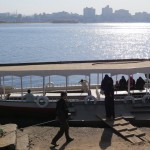 To go to Sudan from Egypt we have to take the ferry that runs between Aswan in Egypt and Wadi Halfa in Sudan. The boat runs on Lake Nasser, an artificial lake in the Nile that arose when they built a large dam in the 60s in Aswan. There are two land borders through which you can travel on a road from one country to another, but for unknown reasons those borders are not yet in use. Well, you could use the landborder, but only if you have received prior permission pay € 3,000 per vehicle. In that case we prefer to boat! Although that is also easier said than done.
To go to Sudan from Egypt we have to take the ferry that runs between Aswan in Egypt and Wadi Halfa in Sudan. The boat runs on Lake Nasser, an artificial lake in the Nile that arose when they built a large dam in the 60s in Aswan. There are two land borders through which you can travel on a road from one country to another, but for unknown reasons those borders are not yet in use. Well, you could use the landborder, but only if you have received prior permission pay € 3,000 per vehicle. In that case we prefer to boat! Although that is also easier said than done.
The boat runs once a week, but it is not really a regular ferry service. For example, the date and time at which the boat leaves sometimes change, but it also happens that the boat does not run at all for several weeks. The ferry takes only people and luggage, but no motorbikes. So the bikes have to be put on another barge to Wadi Halfa. All in all it is a lot of work, especially if you do not know the way and do not speak the language.
On the Internet a lot of information can be found for travellers like us about the ferry service (especially on Horizons Unlimited). There we found contact details of various ‘fixers’: people who arrange the paperwork for you for a certain fee. We were in contact with Kamal, one of the two fixers in Aswan. From him we learned that the ferry for people would leave on Sunday and the barge for motorbikes leaves on Tuesday.
From other travellers we had understood that Aswan is a good place to wait for the ferry, better than Wadi Halfa. We decided to try to send the bikes to Sudan first and leave a few days later. On the way to Aswan we already had contact with Kamal several times. His English was not good and he sounded quite urgent. While we were still driving through the Egyptian desert at ease, he could call with the message: “I need you bike Monday” or “You must come to Aswan now” or even worse “There are problems. No tickets for you”. We tried not too pay too much attention to his remarks and would sort things out when we got to Aswan.
—
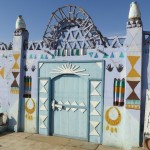 On Monday afternoon we arrive at Adam Home in Aswan from Luxor. We are welcomed by Sammy (a double of Eddie Murphy) and Mohamed (you can say ‘Mo’ ). After we have put our stuff in one of the rooms, Mo invites us for tea. He has lived in England for a few years and speaks good English. He proudly explains that Sammy and he are Nubians, the people who traditionally inhabited this region. He explains in what way Nubians differ from the Arabs in Egypt and tells about Nubian customs and habits. It is a very nice afternoon after such a hot day. When I look in the mirror later I see a red head full of flat “helmet hair”. No wonder Mo remarked that we looked a little tired and thirsty!
On Monday afternoon we arrive at Adam Home in Aswan from Luxor. We are welcomed by Sammy (a double of Eddie Murphy) and Mohamed (you can say ‘Mo’ ). After we have put our stuff in one of the rooms, Mo invites us for tea. He has lived in England for a few years and speaks good English. He proudly explains that Sammy and he are Nubians, the people who traditionally inhabited this region. He explains in what way Nubians differ from the Arabs in Egypt and tells about Nubian customs and habits. It is a very nice afternoon after such a hot day. When I look in the mirror later I see a red head full of flat “helmet hair”. No wonder Mo remarked that we looked a little tired and thirsty!
The rest of the afternoon we use to sort out our stuff. Some of the things will stay on the motorbikes and leave for Sudan the next day. Only the valuable and much needed stuff we keep and will take with us on the boat later.
Among other things we leave the cooking equipment and camping gear on the motorbikes. At Adam Home we therefore stay in one of the basic rooms, so we can pack the mats and the tent.They allow us to use the kitchen, were we prepare some pasta this night. Although we had thought to go to a hotel in the city, we decide to stay the whole week. Especially now we are able to use the kitchen.
After we ate we meet Kamal. He came to Adam Home to talk about the boat, the motorbikes and other administrative matters that we have to settle this week. It is a big man with a hard face. If he had been an actor he would probably only be cast in the role of the ‘bad guy’. Just like on the phone, we sometimes struggle to understand his English and he sounds quite compelling. The things he says and his hard face make that we do not trust him for a bit. That feeling only gets worse if we start negotiations with him about the price for his services. He asks $50 per motorbike, so a total of $ 100. We think it is a lot of money. If we try to negotiate down the amount he demonstratively becomes angry, stands, sticks his finger in the air warning us and threatens to resign. That is when Sammy calls Mo to mediate about the price. With the help of Mo Kamal calms down and the price goes down to $ 40 per motorbike. It still is a lot of money, but we decide to do it. Even though we expect that we could easily obtain a visa for Sudan ourselves, but to find a boat for our bikes is a different story. We decide to have Kamal do everything for us for that price. We agree that we will meet him at the train station in Aswan the next morning at 08:30 am.
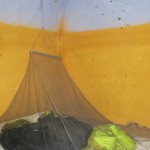 Somewhat unhappy we say goodbye to Kamal and start packing our last things. We have a mosquito net above one of the doubters in the room and crawl into our sleeping bags. We actually only just fit under the net and quickly roll close together in the huge hole in the mattress. Very cosy, but this time the narrow bed, the frustration about Kamal and the concerns about our motorbikes make that we hardly sleep that night. It feels very early the next morning when the alarm goes off.
Somewhat unhappy we say goodbye to Kamal and start packing our last things. We have a mosquito net above one of the doubters in the room and crawl into our sleeping bags. We actually only just fit under the net and quickly roll close together in the huge hole in the mattress. Very cosy, but this time the narrow bed, the frustration about Kamal and the concerns about our motorbikes make that we hardly sleep that night. It feels very early the next morning when the alarm goes off.
We are half an hour early at the train station and decide to find some fuel first. It seems to be had to get gasoline in Sudan, so leaving the ferry in Wadi Halfa with a full tank seems like a good idea. We chat with the friendly Greek pump holder and drive back to the rendezvous point where Kamal is now on waiting for us. He drives an old Peugeot from the 70s which is painted in taxi colours. He does not come out of his car to say hello to us, but indicates us to follow him immediately. We first go to the Sudanese Consulate to apply for visas.
We follow Kamal through the city. We drive almost walking pace, because he has a lot of trouble to avoid the many potholes in the road and not drive his car to pieces. We park our bikes at the consulate and follow Kamal inside. Everyone seems to know him. We are asked to take seat in the waiting room. It looks clean and neat, much better than the Egyptian government buildings that we have gone in so far. The walls are white, the electrical wires are neatly tucked away and there are clean seats. We fill out a brief application form and give it to one of the employees of the consulate. He lets us know that we can pick up the visa Thursday morning (two days later). Kamal is still talking to that same employee for a while before we follow him outside again. That was it! Applying for the Sudanese visa was easy and was not remotely like the complicated procedure that Kamal had promised the night before. Compared to the Libyan – Egyptian border, this was a breeze. We feel a bit conned by Kamal and step in silence on our bikes.
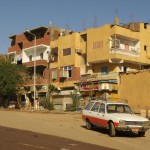 We follow him to another part of the city where we go to the office of Traffic Police. Kamal asks Peter to go with him while I wait outside with the motorbikes. It is warm in the sun and takes quite a while before Peter and Kamal come back out again. When I ask Peter what they have done, he shrugs. It is not exactly clear to him, something with our Egyptian driver’s license or with Egyptian license plates. It remains a mystery.
We follow him to another part of the city where we go to the office of Traffic Police. Kamal asks Peter to go with him while I wait outside with the motorbikes. It is warm in the sun and takes quite a while before Peter and Kamal come back out again. When I ask Peter what they have done, he shrugs. It is not exactly clear to him, something with our Egyptian driver’s license or with Egyptian license plates. It remains a mystery.
We follow Kamal through Aswan again. In the middle of town he stops and two men of the traffic police get into his car. Then we drive out of town towards the harbour, which is about 30km outside the city. We see him stop at a bakery and while he remains in the car, he buys some bread. I get off the bike and follow his example buying some bread. It is now almost noon and we both could eat something. Across the street Peter buys a drink. A few hundred meters further Kamal stops again and he orders us to come and stand beside him. From the car he explains that we can copy our documents here. In the meantime he goes to the harbour to drop off his passengers and will wait for us there. Once all copies are made, we also drive to the entrance to the harbour. We are stopped by the guard who asks us to wait for Kamal at the entrance. After some time, Kamal pick us up and takes us inside the compound.
Just after the entrance we are asked to stop at the office of customs. Our bags have to be examined. A stern looking man asks us to take our bags to the scanning device. After a chat with him about our travels he is suddenly a lot more friendly and only looks at the rest of our stuff with half an eye. He seems to find the chat more important.
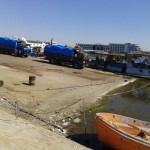 When we are done here, we follow Kamal to another office. Kamal asks us to park in front of the door and then disappears inside. It is now a little after 12 pm and quite warm. We find a place in the shade and have a drink. It takes a long time before Kamal comes out of the office again, accompanied by two other men. They walk past us busy talking and go to a boat that is just down the harbour. Besides the boat are three trucks full of large blue bags that are loaded one by one on the boat. After a while Kamal comes back and says: “Problem. Big problem”. In the blue bags is fertilizer. The captain did not think it a problem to take our bikes, but the harbour master is afraid that the boat will explode when the sun, the fertilizer and the fuel in our engines somehow come together. The harbour master therefore does not give permission to put our motorbikes on this barge. Tomorrow we have to try to find another boat. Slightly frustrated, we return to Aswan. We agree with Kamal to meet him in the harbour the next morning for another attempt.
When we are done here, we follow Kamal to another office. Kamal asks us to park in front of the door and then disappears inside. It is now a little after 12 pm and quite warm. We find a place in the shade and have a drink. It takes a long time before Kamal comes out of the office again, accompanied by two other men. They walk past us busy talking and go to a boat that is just down the harbour. Besides the boat are three trucks full of large blue bags that are loaded one by one on the boat. After a while Kamal comes back and says: “Problem. Big problem”. In the blue bags is fertilizer. The captain did not think it a problem to take our bikes, but the harbour master is afraid that the boat will explode when the sun, the fertilizer and the fuel in our engines somehow come together. The harbour master therefore does not give permission to put our motorbikes on this barge. Tomorrow we have to try to find another boat. Slightly frustrated, we return to Aswan. We agree with Kamal to meet him in the harbour the next morning for another attempt.
It is three o’clock in the afternoon when we park our bikes at Adam Home. Sammy and Mo are amazed to see us with our motorbikes. We exchange our warm motorbike gear for another outfit, join Sammy and Mo for a sweet tea and finally eat our bread. As we still have the bikes and all of our stuff, we get the tent out again. We do not want to move to the city, but we do not want to spend another five nights in the bumpy bed either. We pitch our tent, do some shopping, eat pasta again and then crawl in our own ‘home’, away from the mosquitoes.
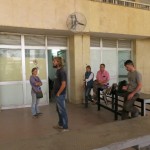 The next morning we drive to the harbor to meet Kamal. As agreed we are at the entrance at ten o’clock in the morning. Today we are not requested to go to customs again to show our bags and we are just waved through by the talker of the day before. We park our bikes next two tough looking and fully equipped Land Rovers. At the office of the harbor master we meet a couple from Great Britain and Sylvie and Monch from Switzerland (blog). They have arrived in Aswan a few days earlier and have since waited for their cars to arrive. Like us, they use Kamal as their fixer. He needs to go back to the city for them to arrange for some paperwork and asks us to fill out some paperwork in the meantime so that the harbour master can stamp our Carnets de Passages. Once the papers are filled out, the long wait for Kamals return from Aswan begins.
The next morning we drive to the harbor to meet Kamal. As agreed we are at the entrance at ten o’clock in the morning. Today we are not requested to go to customs again to show our bags and we are just waved through by the talker of the day before. We park our bikes next two tough looking and fully equipped Land Rovers. At the office of the harbor master we meet a couple from Great Britain and Sylvie and Monch from Switzerland (blog). They have arrived in Aswan a few days earlier and have since waited for their cars to arrive. Like us, they use Kamal as their fixer. He needs to go back to the city for them to arrange for some paperwork and asks us to fill out some paperwork in the meantime so that the harbour master can stamp our Carnets de Passages. Once the papers are filled out, the long wait for Kamals return from Aswan begins.
It takes a very long time. We chat with the other overlanders, exchange tips and routes, and listen to their stories. They are already a long time on the road (two and four years, respectively). While we are still full of energy and look forward to the adventures yet to come, they seem a bit on the end of their tether. They had to wait a long time until their cars arrived in Aswan and have camped under primitive conditions in Sudan before that. They now look forward to the comfort of an all-inclusive resort on the Red Sea.
It is late in the afternoon when Kamal returns in the harbour. He is in an extremely bad mood and does not seem to feel well. We are told that we can take our bikes on the boat, while he finishes the paperwork for the other overlanders.
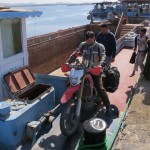 We ride our bikes to the boat. The boat lies transversely along the sloping embankment. One of the men gestures: “Well, drive on”. I watch him for a moment in disbelief, because the boat is still quite high compared to the wharf and without a drive-plate it is quit hard to get the bike on the boat. We first ask where they want us to park the bikes. At the other side of the boat is a place at the front of the deck. The men shows us how they think we get there: Drive along the edge (on the quay side), over a 50cm high metal threshold, then turn twice and finally ride along the edge (on the water side) to the front of the boat. We look at each other in amazement. The men look very serious so their are probably not joking. It is doable to ride along the quay side on the boat, riding on the waterfront is a lot harder, making the turns seems pretty hard and lifting the bikes over the thresholds is definitely impossible. On the front of the boat there is also a spot on the quay side of the boat. When I ask if the motors are allowed to stand there,by showing them how to get there, the men talk to each other. We hear some grunts of approval and are told that we can park them in front.
We ride our bikes to the boat. The boat lies transversely along the sloping embankment. One of the men gestures: “Well, drive on”. I watch him for a moment in disbelief, because the boat is still quite high compared to the wharf and without a drive-plate it is quit hard to get the bike on the boat. We first ask where they want us to park the bikes. At the other side of the boat is a place at the front of the deck. The men shows us how they think we get there: Drive along the edge (on the quay side), over a 50cm high metal threshold, then turn twice and finally ride along the edge (on the water side) to the front of the boat. We look at each other in amazement. The men look very serious so their are probably not joking. It is doable to ride along the quay side on the boat, riding on the waterfront is a lot harder, making the turns seems pretty hard and lifting the bikes over the thresholds is definitely impossible. On the front of the boat there is also a spot on the quay side of the boat. When I ask if the motors are allowed to stand there,by showing them how to get there, the men talk to each other. We hear some grunts of approval and are told that we can park them in front.
Before I even notice, Peter has already put his motorcycle on the boat. With the help of the men, his bike is put on the foredeck. Then he also puts my motorbike on the boat. With some pushing and pulling, bended plastic, dimpled bags, a small curse and a lot of sweat the bikes are both placed next to each other. We are glad that we were are travelling on the small CRFs, because this would have been a lot hard on the Transalp and the Africa Twin. The motorbikes are very close to the anchor chain and ratchet. We hope that this will not be a problem. One last photo and then we walk back to the harbour office. It is a very strange feeling to leave the motorbikes and a large part of our gear on the boat and even hand over the keys to the captain. We hope for the best.
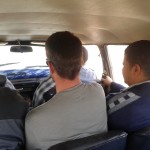 Back at the harbour office the other overlanders have also finished their paperwork. We say goodbye to them, wish them a lot of fun on the Red Sea and step into Kamals car to drive back to the city. It is late in the afternoon and the end of the working day for the staff at the harbour. In addition to Peter and me, Kamal takes three other men to Aswan. We only just fit in the old extended Peugeot, but it is not comfortable. Peter sits with two of the three passengers in the first back seat and I an behind them with our motorcycle jackets and helmets. The old car has already endured a lot since the 70s and waddles across the road. The suspension is so worn out that I hit my head against the ceiling several times when we go through the many holes in the roads. Luckily it is only for a short ride.
Back at the harbour office the other overlanders have also finished their paperwork. We say goodbye to them, wish them a lot of fun on the Red Sea and step into Kamals car to drive back to the city. It is late in the afternoon and the end of the working day for the staff at the harbour. In addition to Peter and me, Kamal takes three other men to Aswan. We only just fit in the old extended Peugeot, but it is not comfortable. Peter sits with two of the three passengers in the first back seat and I an behind them with our motorcycle jackets and helmets. The old car has already endured a lot since the 70s and waddles across the road. The suspension is so worn out that I hit my head against the ceiling several times when we go through the many holes in the roads. Luckily it is only for a short ride.
At some point we turn off the main road. One of the men explains that we need to go somewhere, but that it will only take 5 minutes. We do not understand exactly where we are going and why, but we will see. Maybe one of the men has to go here. We drive into a street that is full of garages. The one in a well maintained building with “Toyota” or “Nissan” on the wall. The other in no more than a shack made of corrugated iron. The soil is black with oil and is littered with engine parts and tires.
Kamal and the men from the harbour step out and ask us to wait in the car. They walk across the street to one of the garages and start a conversation with one of the customers there. The conversation quickly turns into a heated discussion in which they are screaming. People come running up from all angles and there soon is a large audience. A man seems to want to fight with Kamal and is stopped by the spectators. The men from the port do the talking on behalf of Kamal, while he is watching from the side.
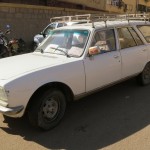 Peter is now out of the car and understands from one of the men from the port that Kamal had a car accident that morning. That explains why we had to wait so long for him and why he was in such a bad mood. The driver had asked Kamal to pay a large sum of money to repair the car. When he did not want to pay, he was beaten and punched by the driver and his friends. Kamal had also called in the help of his friends. While he was driving back to the harbour to finish our paperwork with another car, his friends had gone off to the driver and his friends. They had been a bit more rigorously and threatened with by a knife. That was too much.
Peter is now out of the car and understands from one of the men from the port that Kamal had a car accident that morning. That explains why we had to wait so long for him and why he was in such a bad mood. The driver had asked Kamal to pay a large sum of money to repair the car. When he did not want to pay, he was beaten and punched by the driver and his friends. Kamal had also called in the help of his friends. While he was driving back to the harbour to finish our paperwork with another car, his friends had gone off to the driver and his friends. They had been a bit more rigorously and threatened with by a knife. That was too much.
Now the paperwork is completed and the work is done, Kamal tries to restore the situation with the other driver with the help of the men from the harbour. All the bystanders seem to have to interfere with the dispute. The atmosphere is grim and I am told to stay in the car. We do not feel at ease and find it annoying that Kamal involves us in this. That feeling is strengthened when a stranger gets into the car of Kamal, start the car and starts to drive it, while I am still in the car!! When the car stops a few meters away, I immediately step out. I would rather stand outside the car with Peter on the street, instead of being on my own in a way too hot car that is driven away by another person.
It takes a long time before the calm is restored. While we are waiting for Kamal in the blazing sun, he drinks tea with the angry driver and Kamals mediators in one of the garages. While drinking tea, they eventually find a solution that does not involve any insurance or police.
We are a bit fed up. ’Quickly taking the bikes to the boat’ is now already taking most of the day. We let Kamal take us to the ferry and call Mo we are ’coming home’. When we get to the other side of the Nile, he is already waiting for us. At the sight of our heated heads, he puts on the air conditioning in his car and directly takes us to Adam Home. Once there, we drink mint tea and let the frustrations about Kamal slide off.
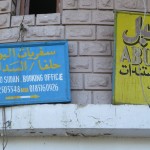 The next morning, we need to go to Aswan once more to complete the final administrative things. Mo brings us to the ferry and on the other side we get into Kamals car. The door of the car is repaired and Kamal looks a lot better as well. We ride with him to the Sudanese consulate to pick up our visas. While we are waiting for our turn, we meet Tulsi, the Chinese cyclist, who is also there to pick up his visa. Like us, he had waiting only two days before he could pick up his visa. And this without a fixer! For us it is clear now that we could have obtained the visa without the help of Kamal easily. When we remark that (unlike what Kamal had told us) it does not take six days to get the visa, Kamal tries to safe his skin by stating that he had put in a good word for Tulsi. At this point we do not believe a word he is saying any more and consider it to be a good lesson for next time.
The next morning, we need to go to Aswan once more to complete the final administrative things. Mo brings us to the ferry and on the other side we get into Kamals car. The door of the car is repaired and Kamal looks a lot better as well. We ride with him to the Sudanese consulate to pick up our visas. While we are waiting for our turn, we meet Tulsi, the Chinese cyclist, who is also there to pick up his visa. Like us, he had waiting only two days before he could pick up his visa. And this without a fixer! For us it is clear now that we could have obtained the visa without the help of Kamal easily. When we remark that (unlike what Kamal had told us) it does not take six days to get the visa, Kamal tries to safe his skin by stating that he had put in a good word for Tulsi. At this point we do not believe a word he is saying any more and consider it to be a good lesson for next time.
With a Sudanese visa in our pocket, we drive with Kamal to the ferry ticket office. The procedure for buying a ticket for the ferry to Sudan is an entire different story. The boat to Sudan is so busy that the tickets are usually sold out in a morning. If the sales start on Monday morning for the boot that leaves the following Sunday, there is usually a large group of people waiting. Some of them even sleep in front of the office to get a ticket. This is the first time we have the idea that Kamal is worth his money. While we were having breakfast in Luxor on the morning we drove to Aswan, Kamal had already been in the line as of 06:00 AM to buy our tickets. At least, to put our names on a passenger as we could only actually buy the tickets today now we have a visa for Sudan.
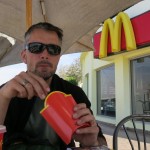 At the ticket office, we meet Tulsi again. On Monday we met him while we were all on our way to Aswan, so he had not been standing in line for tickets either. Friends of his had however put his name on the passenger list, so he had now come to buy his ticket. Unfortunately, the clerk could not find his name on the list. There were no more tickets, so he had no other option than to wait another week for the next boat. And not only that, he should also stand in line again the following Monday to buy a ticket, because -even though he was in the ticket office now- tickets for the next boot would only be sold then. Wow!! Too bad, because that would also mean that we would not be on the same boat to Sudan.
At the ticket office, we meet Tulsi again. On Monday we met him while we were all on our way to Aswan, so he had not been standing in line for tickets either. Friends of his had however put his name on the passenger list, so he had now come to buy his ticket. Unfortunately, the clerk could not find his name on the list. There were no more tickets, so he had no other option than to wait another week for the next boat. And not only that, he should also stand in line again the following Monday to buy a ticket, because -even though he was in the ticket office now- tickets for the next boot would only be sold then. Wow!! Too bad, because that would also mean that we would not be on the same boat to Sudan.
Somewhat happier with the services of Kamal, we get back in his car again. The last thing he then helps us with is changing our Egyptian Pound for Sudanese Pound and than we are done for now: the bikes are on the boat to Sudan, our Carnet de Passages is stamped, we have tickets for the boat and enough money to cross Sudan. On Sunday he will only still help us with the final formalities before we step on the boat. We have Kamal bring us to McDonalds and eat thick burgers and delicious fries. It tastes even better than at home 
Now most of the work is done, we can enjoy two days of relaxing in Adam Home and Aswan. Mo is not only the contact person for all 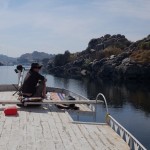 international guests at Adam Home, but also captain of a motorboat. Together with his cousin Sherif, he owns a motorboat. That could be fun: sailing on the Nile. On Friday, after we slept in late, Mo takes us to his boat. Cousin Sherif has already started the boat and has laid cushions on the roof of the boat. Near the city is still quite busy on the water, but after the rapids we are practically the only ones on the water. We sail along the botanical gardens, Elephantine Island, several Nubian villages and the Old Cataract Hotel (where Agatha Christie wrote “Murder on the Nile”). Every now and then Mo sticks his head through the stairwell to tell us about all the sights. We sail until we can see the dam and then turn around towards Aswan again. Halfway we eat a delicious lunch and during which Peter attempts to catch fish for dinner.
international guests at Adam Home, but also captain of a motorboat. Together with his cousin Sherif, he owns a motorboat. That could be fun: sailing on the Nile. On Friday, after we slept in late, Mo takes us to his boat. Cousin Sherif has already started the boat and has laid cushions on the roof of the boat. Near the city is still quite busy on the water, but after the rapids we are practically the only ones on the water. We sail along the botanical gardens, Elephantine Island, several Nubian villages and the Old Cataract Hotel (where Agatha Christie wrote “Murder on the Nile”). Every now and then Mo sticks his head through the stairwell to tell us about all the sights. We sail until we can see the dam and then turn around towards Aswan again. Halfway we eat a delicious lunch and during which Peter attempts to catch fish for dinner.
That afternoon and the next day we do virtually nothing. We sleep in late, drink tea with Mo and Sammy, go for a walk along the Nile and do work on the blog. On Saterday, Mo takes us to his village, introduces us to his parents and shows us his newly built home. We can use his computer to upload some pictures to the blog and help him to open a Facebook page for Adam Home. All in all a perfect relaxing ending to an otherwise busy week in Aswan.
Driving distance from the boat to Sudan: 7,692 km (4,779 miles)





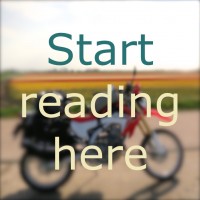
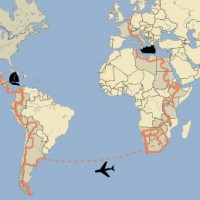
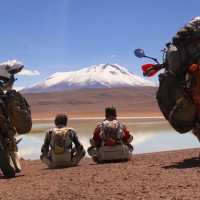
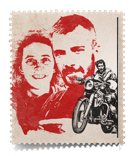
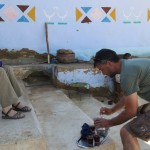
Great post!
Jeetje dat was me allemaal wat. Meest spannende stukje vond ik wel dat Leonie in die auto zat waarmee die man weg wilde rijden. Maar gelukkig liep het allemaal goed af. Ik liep even achter, dadelijk meteen jullie volgende verhaal, leuk!